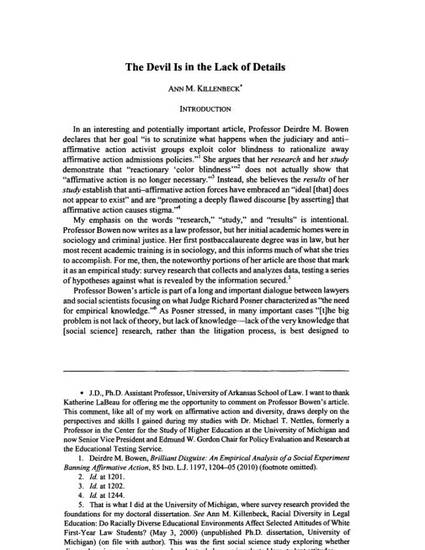
Article
The Devil is in the Lack of Details
Indiana Law Journal
(2010)
Abstract
In an interesting and potentially important article, Professor Deirdre M. Bowen declares that her goal "is to scrutinize what happens when the judiciary and anti-affirmative action activist groups exploit color blindness to rationalize away affirmative action admissions policies."' She argues that her research and her study demonstrate that "reactionary 'color blindness' does not actually show that "affirmative action is no longer necessary." Instead, she believes the results of her study establish that anti-affirmative action forces have embraced an "ideal [that] does not appear to exist" and are "promoting a deeply flawed discourse [by asserting] that affirmative action causes stigma."
My emphasis on the words "research," "study," and "results" is intentional. Professor Bowen now writes as a law professor, but her initial academic homes were in sociology and criminal justice. Her first post-baccalaureate degree was in law, but her most recent academic training is in sociology, and this informs much of what she tries to accomplish. For me, then, the noteworthy portions of her article are those that mark it as an empirical study: survey research that collects and analyzes data, testing a series of hypotheses against what is revealed by the information secured.
Professor Bowen's article is part of a long and important dialogue between lawyers and social scientists focusing on what Judge Richard Posner characterized as "the need for empirical knowledge."As Posner stressed, in many important cases "[t]he big problem is not lack of theory, but lack of knowledge-lack of the very knowledge that [social science] research, rather than the litigation process, is best designed to produce." Indeed, Professor Bowen ties her work to one of the most significant decisions in the law and social science canon, Brown v. Board of Education, arguing that "Just as the Supreme Court in Brown ...considered empirical evidence as it
contemplated which social experiment should be adopted-integration or segregation-this study offers legislators and courts alike the opportunity to take the bold step of breathing new life into affirmative action."
Perhaps.
Professor Bowen believes that affirmative action's opponents ignore "the legacy of past racism" and refuse to "confront present racism." There are many who disagree, viewing affirmative action as a form of invidious discrimination" and, in the noteworthy case of Justice Clarence Thomas, as "racial paternalism" that demeans and harms the very individuals it is supposedly designed to benefit. My goal in this brief Commentary is not to take sides in this debate. Rather, I want to do three things. First, I will stress why rigorous and objective social science studies are so important in this area. Second, I will raise questions about the extent to which Professor Bowen has actually conducted a rigorous study showing that affirmative action itself is responsible for many of the effects she identifies. Third, I will note why, in spite of this, certain of her findings are interesting given a key aspect of the majority opinion in Grutterv. Bollinger; that is, its acceptance of the argument that institutions may consciously attempt to assemble a "critical mass" of minority students as part of a constitutionally sound affirmative action plan. In particular, I will show why Professor Bowen's arguments about the value of a critical mass-and the harms she posits when one is not present-are suggestive but incomplete, given what I believe to be the single most important obligation imposed on institutions employing affirmative action in pursuit of diversity: the need to engage in proactive programming as an integral part of its efforts.
Disciplines
Publication Date
2010
Citation Information
Ann M. Killenbeck. "The Devil is in the Lack of Details" Indiana Law Journal Vol. 85 (2010) p. 1261 Available at: http://works.bepress.com/ann-killenbeck/3/
